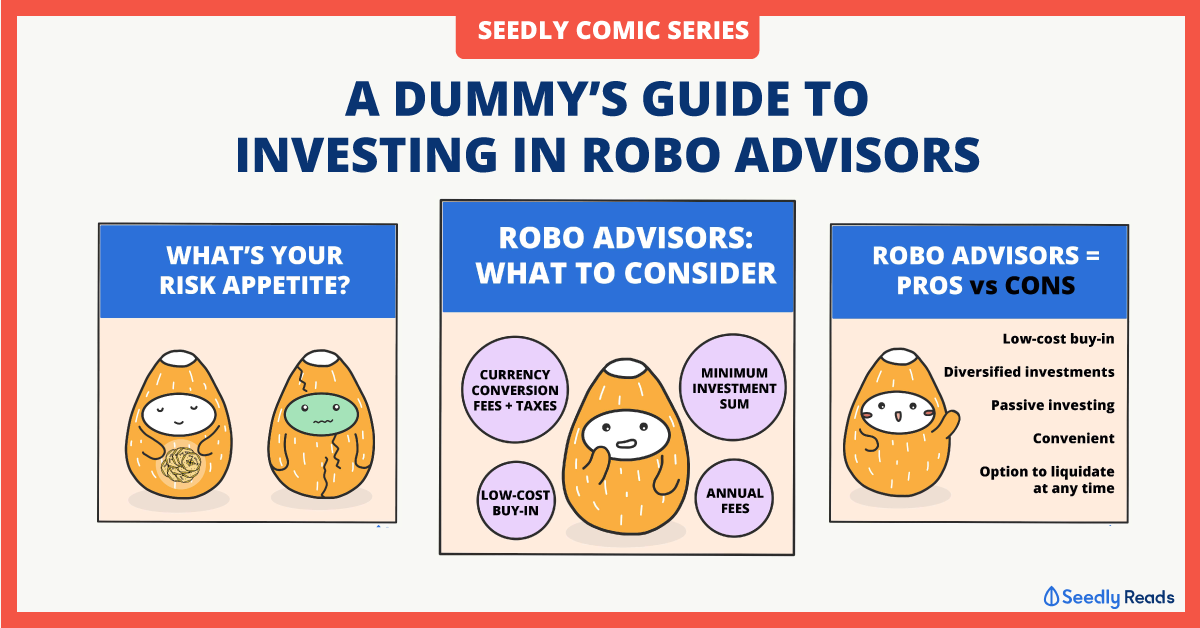Hi Dominic! I’ve been doing some research into the common investment options available and considered ETFs vs Robo-Advisors too so here’s my little analysis.
Some quick facts about ETFs:
- When you buy a stock of an ETF, you are buying into a basket of weighted shares.
- They are medium to high risk investments that have high returns.
- These are great for passive investors wanting to diversify at a low cost with relatively low effort.
- E.g. STI ETF
- We actually have a checklist on choosing the right ETF here!
Some quick facts about Robo-Advisors:
- Digital platforms that make automated and algorithm-driven investment decisions instead of going through an actual, human fund manager.
- They are low to high risk investments with low to high returns (customisable).
- These are great for passive investors wanting to diversify at a low cost with very little effort.
- E.g. StashAway, AutoWealth, MoneyOwl, Endowus
- We’ve done up a comparison of all the Robo-Advisor companies in Singapore too, check it out here!
TL;DR You should make a long term investment in Robo-Advisors if you’re an investor that:
- Don’t mind the lack of control over the exact ETFs or securities you’re investing your money in
- Want a purely passive investment option that requires minimal effort but is highly diverse too
- Don’t mind paying additional fees for the Robo-Advisor to do the manual work for you
- Is new to investing and would like to explore this alternative of investing

Now moving on to comparing between ETFs and Robo-Advisors:
#1 What is being invested:
- ETFs: If you’re looking at the STI ETF then it would be a local ETF. It would expose you to companies in various sectors in Singapore, albeit heavily focused on the banking & finance ones. Investing in ETFs as an individual gives you the freedom to DIY.
- Robo-Advisors: They would usually invest in a basket of global ETFs (mostly US ETFs), exposing you to the global economy in different sectors. They are usually diversified through a mix of equities and bonds in the portfolio. Some of these ETFs are not available to retail investors too.
#2 Degree of autonomy:
- Investing in ETFs directly would give you full control and flexibility over which ones you would like to invest your money in.
- Investing via Robo-Advisors wouldn’t give you as much control over the specific ETFs/bonds/equities you would like to invest in as the algorithm would help decide for you. Investing through the algorithm may not cater to your specific investment needs compared to investing with a human touch. HOWEVER, you would still be able to customise based on your risk appetite, income, financial goals .etc.
#3 Method of investment:
- ETFs: You can make a lump sum investment through a brokerage account OR make monthly investments through your bank account or POEMS.
- Robo-Advisors: Each Robo-Advisor company has its own method of investment using different algorithms and models.
- Investing through Robo-Advisors would usually be easier as there’s no need to submit any documents to the brokerage firm or pass any instructions down. Simply sign up and let the app’s algorithm do the work for you.
#4 Costs associated:
While the fees associated with Robo-Advisors are indeed lower than investing via a fund manager, you would still incur additional costs compared to buying the ETF and managing your investment portfolio on your own. Therefore, you should evaluate if these Robo-Advisor fees are worth it in the long term. Intermediary fees aside, do take note of minimum investments and transaction costs associated with investing in ETFs as an individual too. Some Robo-Advisor companies might have minimum investments too!
Long term investments:
You mentioned that you’re looking for a long term investment strategy and both ETFs and Robo-Advisors are great investment options for the long term as they are both liquid.
This means that you can sell your portfolio whenever you deem fit, or in your case, when your ‘long term’ timeframe is up. I personally find Robo-Advisors more liquid than ETFs. Since the algorithm would manage your entire portfolio, you can decide to cease the long term investment whenever you like to. Investing in ETFs as an individual means managing and reviewing your portfolio on your own before selling them away. I feel that this process would take a tad bit more effort and time compared to leaving it in the hands of the Robo-Advisor’s algorithm. But at the end of the day, to each his own.
More importantly, diversifying is key :) Ultimately, you can invest in both Robo-Advisors and ETFs at the same time as your long term investment strategy as they both help to diversify your portfolio. I hope this was helpful to you!












Hi Dominic! I’ve been doing some research into the common investment options available and considered ETFs vs Robo-Advisors too so here’s my little analysis.
Some quick facts about ETFs:
Some quick facts about Robo-Advisors:
TL;DR You should make a long term investment in Robo-Advisors if you’re an investor that:
Now moving on to comparing between ETFs and Robo-Advisors:
#1 What is being invested:
#2 Degree of autonomy:
#3 Method of investment:
#4 Costs associated:
While the fees associated with Robo-Advisors are indeed lower than investing via a fund manager, you would still incur additional costs compared to buying the ETF and managing your investment portfolio on your own. Therefore, you should evaluate if these Robo-Advisor fees are worth it in the long term. Intermediary fees aside, do take note of minimum investments and transaction costs associated with investing in ETFs as an individual too. Some Robo-Advisor companies might have minimum investments too!
Long term investments:
You mentioned that you’re looking for a long term investment strategy and both ETFs and Robo-Advisors are great investment options for the long term as they are both liquid.
This means that you can sell your portfolio whenever you deem fit, or in your case, when your ‘long term’ timeframe is up. I personally find Robo-Advisors more liquid than ETFs. Since the algorithm would manage your entire portfolio, you can decide to cease the long term investment whenever you like to. Investing in ETFs as an individual means managing and reviewing your portfolio on your own before selling them away. I feel that this process would take a tad bit more effort and time compared to leaving it in the hands of the Robo-Advisor’s algorithm. But at the end of the day, to each his own.
More importantly, diversifying is key :) Ultimately, you can invest in both Robo-Advisors and ETFs at the same time as your long term investment strategy as they both help to diversify your portfolio. I hope this was helpful to you!